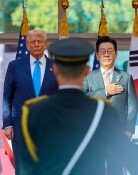Gap Exists in Corporate Law, Reality
Gap Exists in Corporate Law, Reality
Posted April. 18, 2008 03:21,
The special prosecution team for Samsung Groups alleged slush funds released the outcome of its investigation Thursday, indicting 10 Samsung executives, including Chairman Lee Kun-hee, without detention.
Experts say that the team did not detain them while confirming suspicions against them, because it agonized over the potential impact of its decision on the national economy and the gap between legal justice and business reality.
Indeed, special prosecutor Cho Joon-woong wrote in the press release that the probe outcome is a criminal punishment of today of deeply entrenched wrongdoing in maintaining a chaebols business management and management structure by judging it with strict legal standards and that it is different from typical breach of trust and tax evasion caused by personal greed of members of an organization.
Cho also added, In some ways, such a crime is caused by the gap in reality surrounding ownership and management of chaebols and legal, institutional tools.
It seems clear that Lee and other executives in question violated laws. But it is also true that it is hard to just blame Samsung, considering historical corporate practices.
Indeed, many in the business community said, In 1987, when Lee Kun-hee became the chairman of Samsung Group, there was a prevailing negative perception of conglomerates in society. In particular, regulations on stakes of large shareholders continued to be strengthened. In a situation where his stake ownership is vulnerable, Lee had to secure stakes even by using others names to protect and defend the groups management control.
Samsung also explained, The practices in question basically emerged from the need to scatter stakes to protect and defend management rights, while acknowledging that such practices are plain wrong.
The conglomerate also said that it somehow enjoyed capital gains in the process of selling stakes in accounts under its employees names upon their death or retirement, rather than planning in advance to evade taxes.
The business community is raising its voice that the government should understand businesses realistic agonies about management control issues and that the related laws, which forced Samsung to illicitly transfer management control, need to be reformed. In particular, it is urging institutional reform, saying that it is not easy for corporate to transfer their management control under the current inheritance tax system.
In relation to this issue, leaders of business organizations, including Korea Chamber of Commerce and Industry Chairman Sohn Kyung-shik, maintained, In most cases, one has to sell his or her inherited stocks or real estate to pay the inheritance tax. Under the circumstances, management control is at stake, demanding that the inheritance tax be converted into the capital gains tax.
A business leader said, Assuming a strict application of the current laws, a considerable number of corporate leaders will face criminal punishment, adding, I dont intend to advocate Samsungs wrongdoing. But we need to bridge the gap between business reality and laws for our national economy.
Hwang In-hak, a director of the Federation of Korean Industries, said, We should watch the decision from the justice authorities, regarding the Samsung issue, and hopefully there should be no more such cases in which speculations over their past deeds serve as obstacles to corporate activities.
bae2150@donga.com







